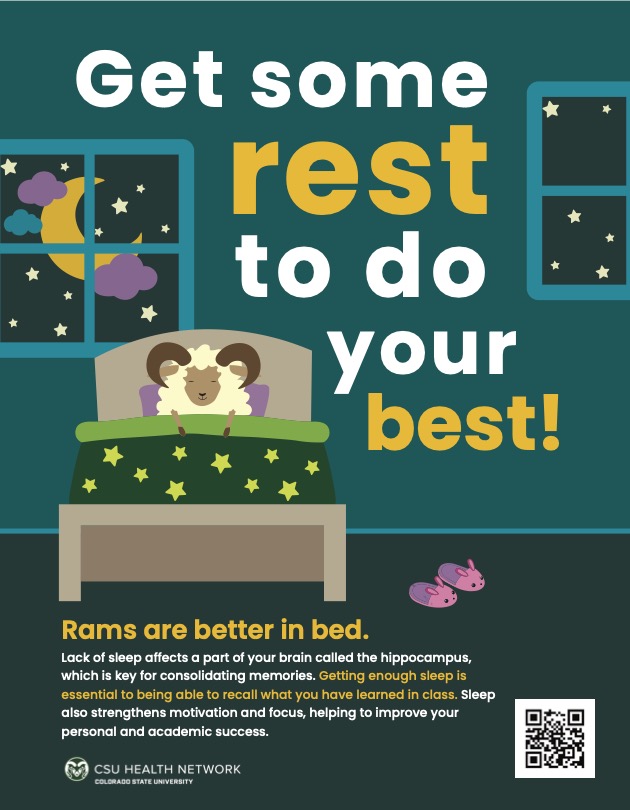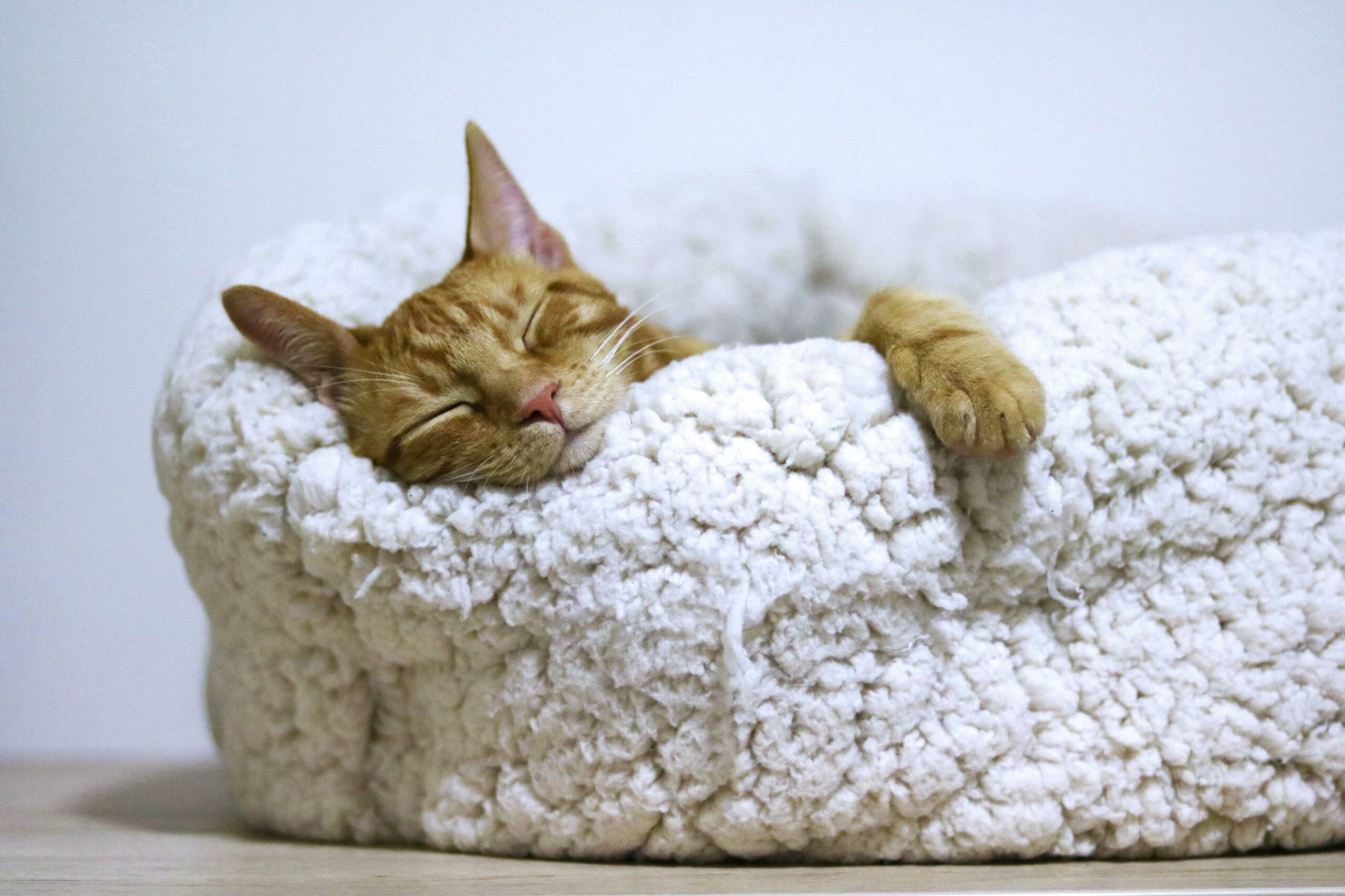Sleep is essential for physical health, mental clarity and emotional balance. During sleep, the body undergoes various complex processes that promote physical and mental restoration. It is characterized by a temporary suspension of consciousness and reduced responsiveness to external stimuli.
Ideally you should go to sleep when you’re tired and when your schedule allows you to get adequate hours of uninterrupted sleep. Sleep serves multiple vital functions. It allows the body to repair and regenerate tissues, consolidate memories, and support cognitive functions like learning and problem-solving. Sleep also plays a crucial role in regulating emotions, mood, and overall mental well-being. Unfortunately, there are many reasons that don’t allow us to do that.
Explore the tabs below to discover ways to improve the frequency and quality of your sleep, as well as discover causes for sleep disruptions and ways to address these issues.
Content adapted from Sleep Doctor and Sleep Health and Harvard Medical
Helpful tips for getting better sleep

- Go to sleep only when sleepy.
- Try to get up at the same time every day, this will help regulate your sleep cycle.
- Keep naps to 10 to 20 minutes known as a “power nap” and try to take them in the early afternoon.
- If you cannot sleep, get out of bed, and do something relaxing like reading. Try relaxation techniques (muscle relaxation, breathing techniques, imagery, etc.). Avoid using your phone or watching TV.
- Try to avoid caffeine in the late afternoon and evening.
- Get vigorous exercise each day – early in the day and try to avoid exercising after 7pm.
- Institute a nightly pre-sleep ritual to prepare you for sleep to wind down and relax.
- Sleep in a room that is cool, quiet, dark, and comfortable. Sleep with covers that can be easily removed or added so you can remain comfortable during the night.
- Try not to study or do homework in bed.
- Avoid alcohol, smoking, or eating (unless it is a small snack) before going to bed.
Sleep and Academic Perfomance
How lack of sleep is impacting academic performance
When you learn new information during the day, it is temporarily stored in the hippocampus, a seahorse-shaped part of your brain behind your eyes. The hippocampus has a limited storage capacity. If you exceed it, you may have difficulty adding new information — or you may overwrite an old memory with a newer one.
Each night while you sleep, the connections between neurons (called synapses) shrink to reduce or eliminate the memories you don’t need — such as what you ate for breakfast last week and the clothes you wore yesterday. This selective pruning of synapses during the night prepares you to form new memories the next day.
Avoid “All-Nighters”
Although our busy schedules may leave us feeling as though an all-nighter is the only option, and in some cases, it is, all-nighters should try to be avoided. A study conducted at Lawrence University showed that students who regularly pulled all-nighters had lower GPAs than those who didn’t regularly pull all-nighters. The body isn’t built to function at its best with no sleep. Sleep allows the brain to organize information and discard any useless information. Without sleep the brain is unable to sift through information and your memory is affected. Not sleeping can also cause physical discomfort like fatigue that can affect performance. The lack of sleep also affects the immune system and lowers its ability to fight illnesses.

Stages of Sleep
A healthy sleep cycle consists of multiple stages. On a night when you get adequate sleep, you’ll cycle through each of these stages possibly several times. Each stage has a different duration, and for some of the stages, their duration will change throughout the course of the night.
Your sleep cycle as a whole plays an important role in brain and body recovery. Spending adequate time in each stage is essential for waking up refreshed in the morning. However, factors such as age and physical health may interfere with your sleep cycle and prevent you from getting the rest you need.
The four stages of sleep fall into two categories. The first three stages are considered non-rapid eye movement sleep (NREM), while the fourth and final stage is rapid eye movement (REM). As the name suggests, REM sleep is distinguished by erratic eye movements behind closed eyelids, but there are other key differences between the REM and NREM stages.
The general breakdown for your sleep cycle stages is as follows:
Sleep Cycle Stage | Type of Sleep | Duration |
NREM 1 | Non-rapid eye movement | 1 to 5 minutes |
NREM 2 | Non-rapid eye movement | 25 to 60 minutes |
NREM 3 | Non-rapid eye movement | 20 to 40 minutes |
REM | Rapid eye movement | 10 to 60 minutes |
Why Are Sleep Cycles Important?
Healthy sleep plays an important role in physical recovery. For example, during the NREM 3 stage, your body repairs its tissue, builds bone and muscle, and recharges the immune system. Sleep is crucial for your immune system, as well. Activity in the sympathetic nervous system decreases during NREM sleep and increases again once REM sleep begins. When you don’t get adequate sleep, your sympathetic nervous system may be too active during the day. This can lower your immune system’s defenses and leave you more susceptible to getting sick.
Nap and Resetting your rhythm
A nap can help people feel alert and refreshed, and it can also boost physical performance, learning, and thinking. Napping is also a way to compensate for a poor night’s sleep. And some indulge in naps for pure enjoyment. It can reduce sleepiness, boost memory, improve your mood, increase learning, and even help reset your sleep cycle. Here are a few tips for napping:
- Avoid napping after 3 p.m.
- Limit your nap to 30 minutes or less.
- Try to block out daylight and noise as much as you can.
- If you nap regularly, try to nap at the same time each day.
- Try to have caffeine right before a nap so that the effects kick in when you wake up.
How long and types of naps matter!
Power Nap
A power nap is a brief nap, generally lasting 10 to 20 minutes. A power nap can be helpful whenever a person feels tired but needs to stay alert, such as in the middle of a work day.
People around the world take power naps to relieve daytime sleepiness and increase their productivity. Research shows that power naps lasting only 10 minutes or less may restore wakefulness for hours afterward.

Recovery Nap
The recovery nap, or replacement nap, is a period of daytime sleep that’s meant to make up for lost nighttime sleep. While naps can’t undo all the problems caused by sleep deprivation at night, they may lessen its impact.
Some people nap to make up for sleep they lose because of a sleep disorder or long hours spent working. Recovery naps may also benefit sleep-deprived parents of babies, as well as athletes who lose sleep because of training and travel schedules.
Older people are often prone to sleep disruption due to health conditions, medication use, or a lack of physical activity during the day. Therefore, they may try to make up for poor sleep at night by taking recovery naps during daytime hours.
Proactive Nap
A person may take a proactive nap, or prophylactic nap, when they anticipate that they will not get enough nighttime sleep. This type of planned nap is typically longer than a power nap and can often last several hours. Proactive naps can be especially helpful for shift workers, such as nurses or emergency responders, who work overnight or irregular hours.
A longer nap allows a person to enter deeper stages of sleep. This can relieve the pressure for sleep that builds up during the day and can help a worker maintain alertness and productivity during their shift.
 Coffee Nap
Coffee Nap
One simple suggestion for alleviating the drowsiness that may follow a nap is to take caffeine right before the nap. While this is commonly called a coffee nap, the caffeine can come from other sources, such as soda, tea, food, or a caffeine pill.
The full effects of caffeine don’t appear until about 30 minutes after it’s taken, so drinking a cup of coffee just before a short nap won’t disrupt your sleep. Instead, it can make you feel even more alert and energized when you wake up.
Appetitive Nap
Some people nap just because it gives them pleasure to do so. People who have no trouble sleeping at night or who are not troubled by daytime fatigue can still enjoy these types of naps, called appetitive naps.
Even a purely recreational nap can impart many benefits. Research has found that 10- to 30-minute appetitive naps can lessen fatigue and confusion, and can also give a boost to a person’s energy levels.
Shortcut to length of time for naps:
- 10-20 minutes: Boosts Energy
- 30 minutes: Groggy symptoms
- 60 minutes: Still groggy but boosts memory
- 90 minutes: Full sleep cycle
Signs of sleep difficulties and disorders
Sleep Deprivation
The lowest amount of sleep an individual needs to function is dependent on the individual. Some individuals have trained themselves to require less sleep. Studies have suggested the least amount of sleep needed to function is four hours, but this varies from individual to individual.
Sleep deprivation affects both your mental and physical health. Inadequate sleep impairs your body’s ability to maintain a healthy immune system, handle stress, think, and moderate our emotions. The brain isn’t able to work effectively without sleep which causes memory to be impaired and concentration levels to drop. Problem solving and decision making abilities are also compromised with insufficient sleep.
Other sleep deprivation effects include:
- Hallucinations
- Depression
- Heart disease
- Hypertension
- Irritability
- Slower reaction times
- Slurred speech
- Tremors

Insomnia
Insomnia is another common sleep disorder. Insomnia is the inability to fall asleep or maintain sleep. A good way to start assessing insomnia is to figure out the pattern and what might be causing it. Everyone will experience insomnia at some point in their lives from stress, anxiety, or environmental factors but consistent insomnia can be a problem and can affect quality of life. There are medications that can help with insomnia but it’s important to remember that these should only be used for a short period of time because the body will build a resistance.
There are also many sleep disorders that should be considered. Other common sleep disorders are: sleep apnea, restless leg syndrome and narcolepsy. The underlying symptoms of these conditions are:
- Feeling unrested and fatigued during the day
- Gasping or snorting during sleep
- Creepy, crawly feelings in the legs and back
- Loss of muscle control with emotion
- The inability to fall asleep or stay asleep
- Hallucinations or vivid dreams while falling asleep
If you have any of these symptoms more than three times a week or your quality of life is affected, contact the CSU Health Network Medical Services or call (970) 491-1721
The Impact of Substances on Sleep
Alcohol
Because alcohol is a nervous system depressant, some may experience an easier time falling asleep. However, alcohol can significantly disrupt your sleep quality. Alcohol is considered a sedative meaning it is sedating your cerebral cortex (the part of your brain that plays a key role in memory, thinking, learning, reasoning, problem-solving, emotions, consciousness and functions related to your senses), but this feeling of sedation is not sleep. While it mimics the characteristics of sleep, just because you are losing consciousness quicker, does not mean your body is getting the restful sleep it needs.
Alcohol also causes more wakes in the night, resulting in fragmented sleep. This is partially impacted by your liver enzymes, slowly metabolizing the alcohol causing us to unconsciously wake at night.
partially impacted by your liver enzymes, slowly metabolizing the alcohol causing us to unconsciously wake at night.
Alcohol is also extremely good at blocking our REM sleep, which is critical for learning and memory, in addition to mental well-being and other emotional functions. Sleep researchers compare REM to therapy, in the sense that it benefits one’s mental health. Studies have shown that one drink for an assigned female at birth (AFAB) and two drinks for an assigned male at birth (AMAB) will decrease sleep quality by up to 39%. Giving your body time to process the alcohol you’ve drunk before you go to bed can greatly improve the overall quality of your sleep.
Cannabis
In a 2022 survey observed around the US and Canada, 50% of cannabis users reported the reason for using was sleep-related. While some people may use cannabis to help them fall asleep, this can affect dreaming and memory consolidation. Cannabis may also cause what some are calling “weed hangovers”, leaving a groggy and fatigued feeling throughout the day.
Though data around sleep and cannabis use can be seen as a bit inconsistent, a common finding is that high doses of THC can lead to poor sleep. Research done over the past decade has been able to show that using high doses of CBD can help sleep, but high doses of THC, the chemical that can induce a high, can obstruct sleep. This can greatly reduce sleep duration and quality of sleep while making the periods one is awake or the feeling wakeful longer (Feriante and Singh, 2023).
Caffeine
Caffeine is a psychoactive stimulant that helps you stay awake by blocking the sleep-inducing chemical, adenosine. The more adenosine you have the more sleepy you feel .
.
Your adenosine levels are lowest right when you wake up, so it is important to know that the time we ingest caffeine matters. It is a good idea to have your first intake of caffeine 60-90 minutes after you wake.
Caffeine has an average quarter-life of 10+ hours meaning even after the initial effects of caffeine wear off, one-fourth of the caffeine consumed can still linger in your body. This can impact your sleep by blocking adenosine around bedtime.
Caffeine can have the greatest benefit when consumed right before a 30-minute nap. Effects of caffeine typically take about 30 minutes to activate giving you enough time to snooze and wake up energized! You can enjoy your caffeine and get a great night’s sleep if you do it right!
It’s important to know how much caffeine is in your drink. Caffeine sensitivity varies among people, so your afternoon latte or energy drink may be causing your sleep loss. You can experiment with avoiding caffeine 6-10 hours before bed to help you find your caffeine sensitivity level.
Resources
When you tried all the tips and need more support, check out these CSU Health Network’s resources:
- YOU@CSU – Explore campus resources and find personalized tips and tools for everything from your mental and physical health to friendships and finding balance. Login at colostate.edu or through RAMweb.
- SilverCloud Health– Self-guided online programs based on Cognitive Behavioral Therapy to help you enhance well-being, manage anxiety and depression, improve your sleep, boost your body image, and more.
- Sleep Group (when it comes to completion)
- CSU Health Network Medical Services has a group of caring professionals ready to assist you regarding your health concerns. For an appointment, call (970) 491-7121
Assessments
- Epworth Sleepiness Scale
- American Psychiatric Association
- Sleep Foundation
- Pittsburgh Sleep Quality Index
- Chronotype– Chronotype is the natural inclination of your body to sleep at a certain time, or what most people understand as being an early bird versus a night owl.
